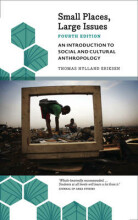Summary: Engaging Anthropological Theory A Social And Political History | 9781138631342 | Mark Moberg
- This + 400k other summaries
- A unique study and practice tool
- Never study anything twice again
- Get the grades you hope for
- 100% sure, 100% understanding
Read the summary and the most important questions on Engaging Anthropological Theory A Social and Political History | 9781138631342 | Mark Moberg
-
1 Week 1
-
1.1 Chapter 4: Theory and practice to change the world
This is a preview. There are 20 more flashcards available for chapter 1.1
Show more cards here -
the capitalist societies of Western Europe consisted almost entirely of two social classes:
- the owners of the means of production (employers or the bourgeoisie),
- who were numerically few, and a much larger majority of people who survived by working for wages (the proletariat).
-
Marx argues that capitalist profit is based on surplus value
value provided by the worker to the capitalist in excess of what he or she is paid. If the capitalist is to remain in business, he must pay each worker less than the value of his or her labor. -
Marx distinguished three levels in any society
Ideology :Juridico-political arrangements :A mode ofproduction consisting of twocomponents :- a) Social
relations ofproduction : patterns of propertyownership ,organization of work - b)
Forces ofproduction :technology , resources, andknowledge of how to use them.
-
Three levels of society is also seen as
Marx’s “birthday cake” -
Marx birthday cake is distinguished by
the “base” of society (its mode of production) and its “superstructure” (ideology and juridico-political arrangements). -
Marx also proposed an evolutionary theory of society, one referred to as historicalmaterialism. Explain this term
Marx held that the cause of all historical movement is to be found in society’s material base; as changes occur in the mode of production with regard to technology and social relations of production, corresponding changes occur at the sociopolitical
and ideological levels. -
Because Marx was an active participant in the Russian revolution of 1917, it can be said that the collapse of the Soviet Union effectively repudiates and refutes Marx’s ideas.True or false?
False -
For Marx, exploitation under capitalism meant that all employers treat their workers with abuse or injustice.True or False
False -
1.2 Chapter 5: Heirs to order and progress
This is a preview. There are 15 more flashcards available for chapter 1.2
Show more cards here -
Marxist thinking continues today in the form of conflict theory
examines how the disparate power and influence of social classes lead to deep disparities in economic opportunity, education, housing, and health. -
Douglas derived four basic institutional forms that co-exist (albeit uneasily) in modern society,
- Hierarchy (strong social regulation and integration),
- Individualism (weak regulation and integration),
- Enclave (weak regulation, strong integration),
- Isolate ordering (strong regulation, weak integration)
- Higher grades + faster learning
- Never study anything twice
- 100% sure, 100% understanding
































